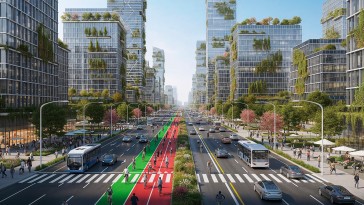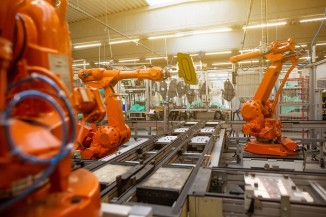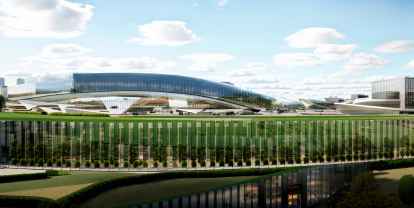Blog / Disruptive Technologies
7 Impressive Smart City Projects in the Middle East
Categories
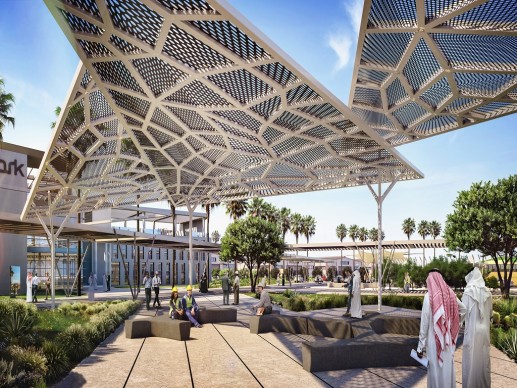
In the ever-evolving landscape of urban development, the Middle East is emerging as a beacon of innovation, paving the way for the cities of tomorrow with amazing smart city projects.
As the world becomes increasingly interconnected and technologically advanced, the concept of smart cities has gained significant momentum. These urban centers are not just urban hubs; they are living, breathing organisms, constantly adapting and evolving to meet the ever-changing needs of their inhabitants.
Join us as we explore eight remarkable smart city projects in the Middle East that are redefining the way we live, work, and thrive in urban environments.
Get ready to be inspired, because the future is unfolding right here, right now!
1. Masdar City, Abu Dhabi, UAE
Summary and Location of the Project:
Masdar City, located in Abu Dhabi, United Arab Emirates, is a groundbreaking smart city project established by Masdar, a subsidiary of the Mubadala Investment Company. Founded in 2006, this ambitious project seeks to create a sustainable, carbon-neutral urban oasis in the midst of the desert.
Challenges it Seeks to Takle:
Masdar City is a promising digital city that addresses several urban challenges, including reducing carbon emissions, conserving energy, and promoting sustainable living in a rapidly urbanizing region. It aims to set a new standard for eco-friendly urban development.
10 Remarkable Smart Features that Solve These Challenges:
Renewable Energy: Masdar City harnesses solar power through its expansive photovoltaic panels, providing clean energy for the entire city.
Efficient Transportation: The Personal Rapid Transit (PRT) system offers automated electric transport, reducing the need for private vehicles.
Zero-Waste Design: Innovative waste management processes ensure minimal waste generation and efficient recycling.
Sustainable Architecture: Building designs maximize natural cooling and minimize energy consumption.
Water Conservation: Advanced technologies, such as treated wastewater reuse, help reduce water consumption.
Integrated Planning: Walkability and compact urban planning reduce the carbon footprint associated with transportation.
Research Hub: Masdar Institute serves as a research hub for sustainable technology and innovation.
Green Spaces: The city features numerous parks and green areas, enhancing the quality of life for residents.
Smart Grid: An intelligent energy grid optimizes energy distribution and consumption.
Sustainable Transportation: Electric and hybrid vehicles are encouraged, reducing emissions and air pollution.
Dr. Sultan Ahmed Al Jaber, Minister of Industry and Advanced Technology and Managing Director of the Abu Dhabi Future Energy Company (Masdar), said:
"Masdar City embodies the UAE's forward-thinking vision for sustainable urban development. It's not just about creating a city that consumes less, but one that produces more in terms of innovation, research, and quality of life. Masdar City stands as a testament to the UAE's commitment to a sustainable future and serves as a global model for smart city development in arid regions”
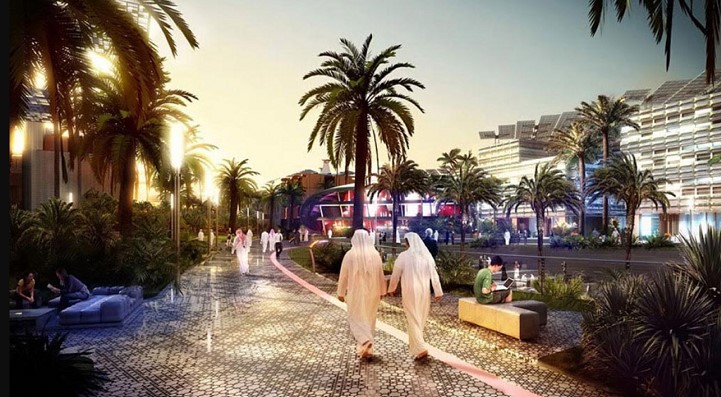
2. King Abdullah Economic City (KAEC), Saudi Arabia
Summary and Location of the Project:
The King Abdullah Economic City (KAEC) is a monumental smart city project situated along the Red Sea coast of Saudi Arabia. Named in honor of the late King Abdullah bin Abdulaziz Al Saud, KAEC is strategically located between the cities of Jeddah and Rabigh, serving as a key driver for economic diversification and development in the Kingdom.
Challenges it Seeks to Takle:
KAEC seeks to address several critical challenges faced by Saudi Arabia, including reducing its dependence on oil revenue, creating new employment opportunities for its growing population, and fostering economic growth in non-oil sectors. This mega-project is designed to be a vibrant hub for commerce, industry, and innovation.
10 Remarkable Smart Features that Solve These Challenges:
Port of the Future: KAEC is home to the King Abdullah Port, one of the world's most advanced, designed to efficiently handle cargo and boost international trade.
Industrial Valley: A dedicated industrial zone encourages manufacturing and industrial development, contributing to economic diversification.
Business District: The Business Park hosts multinational corporations, creating job opportunities and enhancing the Kingdom's global business presence.
Educational Hub: World-class universities and research institutions foster innovation and human capital development.
Sustainable Infrastructure: KAEC emphasizes eco-friendly practices, including renewable energy sources and water conservation technologies.
Smart Transportation: Advanced transportation systems, including an integrated light rail network, promote efficient mobility within the city.
Healthcare Excellence: A state-of-the-art medical center offers high-quality healthcare services to residents and visitors.
Residential Communities: Sustainable, smart neighborhoods provide a high quality of life for residents.
Tourism and Recreation: Cultural attractions, entertainment venues, and waterfront developments enhance tourism opportunities.
Digital Ecosystem: KAEC boasts advanced digital infrastructure, promoting innovation and smart city solutions.
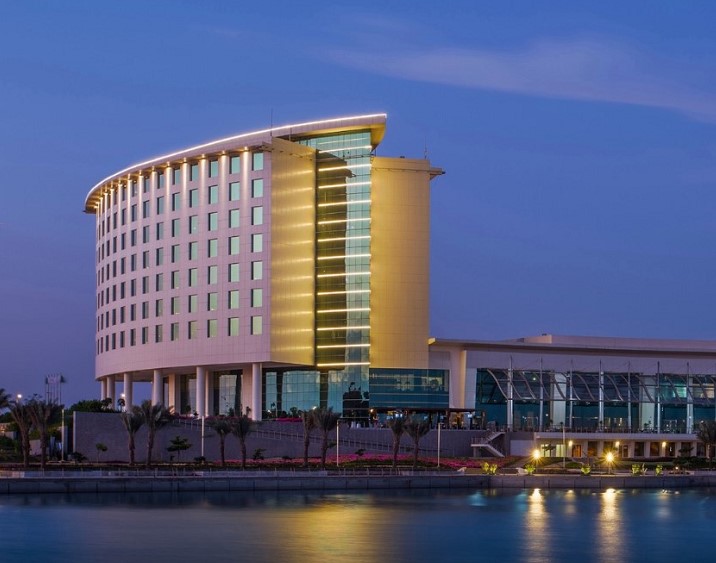
3. King Salman Energy Park (SPARK), Saudi Arabia
Summary and Location of the Project:
King Salman Energy Park (SPARK) is a groundbreaking smart city project located in the Eastern Province of Saudi Arabia. Positioned strategically near the Kingdom's major oil and gas fields, SPARK serves as a hub for energy, industrial, and technological innovation.
Challenges it Seeks to Challenge:
SPARK aims to address several significant challenges faced by Saudi Arabia, including diversifying the economy away from oil dependency, creating job opportunities, and fostering innovation in the energy sector. It aspires to become a global energy and industrial epicenter.
10 Remarkable Smart Features that Solve These Challenges:
Energy Infrastructure: SPARK boasts advanced infrastructure to support the energy sector, including power generation and distribution.
Industrial Zones: Dedicated industrial zones within SPARK attract national and international companies, promoting economic diversification.
Innovation Centers: Research and innovation hubs within the city encourage technology development and knowledge exchange.
Digital Connectivity: High-speed connectivity and data centers support digital transformation and innovation.
Green Initiatives: Sustainability is a priority, with renewable energy sources and eco-friendly practices integrated into the city's design.
Smart Logistics: Advanced logistics and transportation systems enhance efficiency in the movement of goods and materials.
Workforce Development: SPARK invests in education and vocational training to develop a skilled workforce.
Entrepreneurship Support: Programs and initiatives promote entrepreneurship and innovation in the energy sector.
Cultural Exchange: The city fosters a diverse and inclusive environment, encouraging cultural exchange among residents and workers.
Economic Growth: SPARK contributes to the growth of the energy sector, attracting investments and fostering job creation.
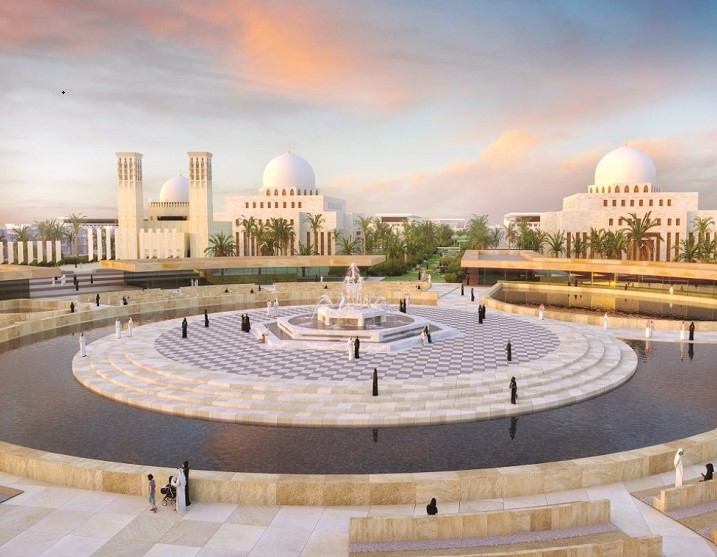
4. Lusail City, Qatar
Summary and Location of the Project:
Lusail City is a visionary smart city project located along the coast of the Persian Gulf, just north of the Qatari capital, Doha. As a flagship development, Lusail aims to redefine urban living and set new standards for sustainability, innovation, and luxury in the heart of Qatar.
Challenges it Seeks to Challenge:
Lusail City seeks to address several urban challenges facing Qatar, including rapid urbanization, sustainable resource management, and the need for a diverse economy. It aims to create a modern, sustainable city that can accommodate the growing population while minimizing environmental impact.
10 Remarkable Smart Features that Solve These Challenges:
Sustainable Transportation: Lusail features an integrated, eco-friendly transportation system, including a light rail network and pedestrian-friendly streets.
Smart Infrastructure: The city incorporates advanced infrastructure for energy, water, and waste management, reducing resource consumption.
Green Spaces: Lusail prioritizes greenery with lush parks and waterfront promenades, enhancing the city's livability.
Lusail Iconic Stadium: As the future host of the FIFA World Cup, the stadium showcases sustainable architectural design and innovation.
Business District: The Lusail Marina District attracts global corporations, fostering economic diversification and growth.
Cultural Offerings: Lusail offers a rich cultural scene with museums, galleries, and theaters.
Luxury Living: High-end residential complexes and luxury amenities redefine the concept of urban living.
Entertainment Hub: Lusail's entertainment city includes theme parks and attractions for residents and tourists.
Marina Promenade: The marina adds to the city's allure, offering waterfront dining, shopping, and leisure activities.
Smart Governance: Digital solutions streamline city services, enhancing efficiency and convenience.
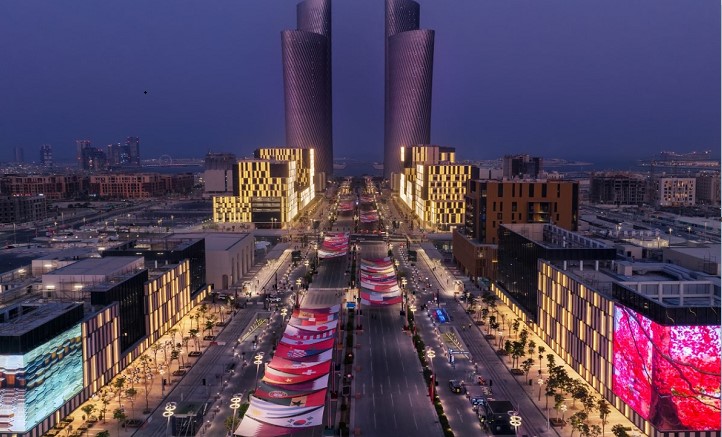
5. Beirut Digital District (BDD), Lebanon
Summary and Location of the Project:
The Beirut Digital District (BDD) is a pioneering smart city project located in the heart of Beirut, Lebanon. It serves as a dynamic hub for the technology and startup ecosystem in the region, providing a collaborative and innovative environment for businesses, entrepreneurs, and tech enthusiasts.
Challenges it Seeks to Challenge:
BDD seeks to address various urban challenges in Beirut, including urban revitalization, the need for modern office spaces, and the desire to foster a vibrant tech-driven economy. It aims to transform the city into a thriving digital and innovation hub.
10 Remarkable Smart Features that Solve These Challenges:
Modern Office Spaces: BDD offers state-of-the-art offices and coworking spaces, attracting tech companies and startups.
High-Speed Connectivity: The district boasts advanced digital infrastructure, ensuring reliable and high-speed internet access.
Startup Incubators: BDD hosts startup incubators and accelerators, nurturing entrepreneurship and innovation.
Green Initiatives: Sustainability is a focus, with green spaces, energy-efficient buildings, and waste reduction measures.
Tech Events: The district hosts tech events, conferences, and meetups to foster collaboration and knowledge sharing.
Cultural Scene: BDD encourages a vibrant cultural scene with art installations and cultural events.
Smart Security: Advanced security measures ensure the safety of residents and visitors.
Entrepreneurial Ecosystem: BDD connects startups with mentors, investors, and resources to support growth.
Diverse Dining Options: A wide range of dining choices promotes social interaction and networking.
Transportation Convenience: Proximity to transportation hubs and infrastructure encourages accessibility.
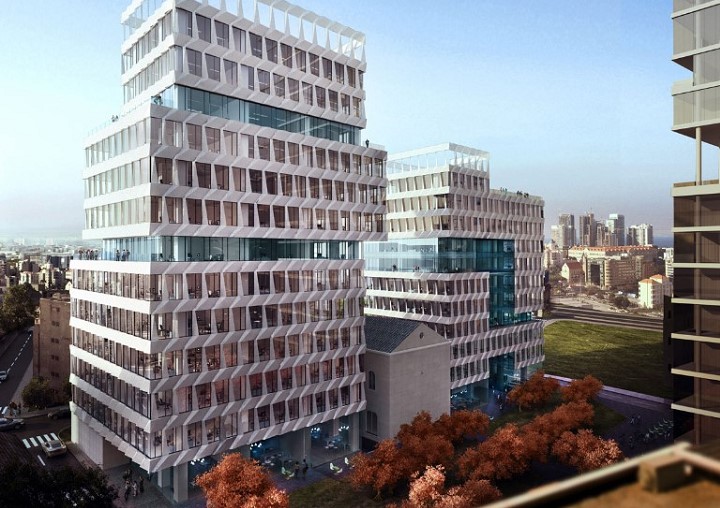
6. Smart Muscat, Oman
Summary and Location of the Project:
Smart Muscat is an ambitious smart city project located in the capital city of Oman, Muscat. It is designed to transform Muscat into a modern and sustainable city that leverages cutting-edge technology to enhance the quality of life for its residents.
Challenges it Seeks to Challenge:
Smart Muscat addresses various urban challenges faced by the city, including traffic congestion, environmental sustainability, efficient public services, and the overall well-being of its population. The project aims to create a city that is both technologically advanced and environmentally responsible.
10 Remarkable Smart Features that Solve These Challenges:
Smart Transportation: Advanced traffic management systems and integrated public transportation networks reduce congestion and improve mobility.
Environmental Sustainability: Smart Muscat prioritizes eco-friendly practices such as renewable energy adoption, waste reduction, and green spaces.
Digital Governance: A digital platform streamlines city services, allowing residents to access government services more efficiently.
Quality Healthcare: Smart healthcare solutions enhance access to quality medical services for Muscat's residents.
Education Hubs: The city includes innovative educational institutions and research centers to foster knowledge and skill development.
Public Safety: Advanced security systems and emergency response capabilities ensure the safety and security of residents.
Community Engagement: Smart Muscat encourages community involvement through digital platforms and citizen feedback mechanisms.
Cultural and Recreational Spaces: The city offers cultural venues and recreational areas to enhance the overall well-being of residents.
Digital Inclusion: Initiatives to bridge the digital divide ensure that all residents can benefit from smart city services.
Economic Growth: By promoting innovation and entrepreneurship, Smart Muscat contributes to economic diversification and growth.
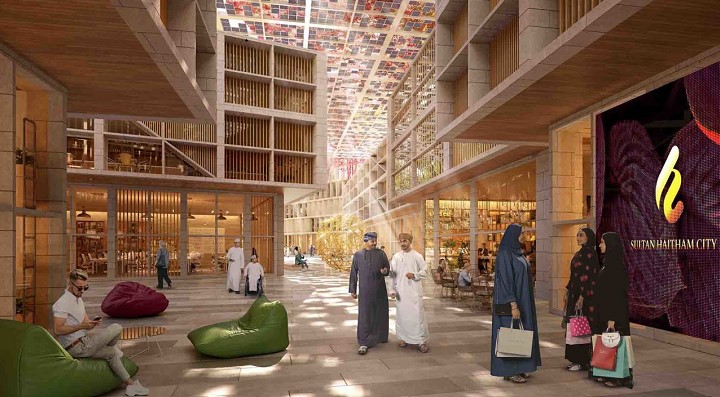
7. Smart Amman, Jordan
Summary and Location of the Project:
Smart Amman is an innovative smart city project situated in the capital city of Jordan, Amman. This initiative is designed to transform Amman into a modern, connected city that leverages cutting-edge technology to enhance urban living and address various challenges.
Challenges it Seeks to Challenge:
Smart Amman addresses several urban challenges faced by the city, including traffic congestion, environmental sustainability, public services efficiency, and economic growth. The project aims to create a city that is more livable, sustainable, and economically vibrant.
10 Remarkable Smart Features that Solve These Challenges:
Smart Mobility: Advanced transportation solutions, including traffic management and public transportation enhancements, reduce congestion and improve commute times.
Green Initiatives: Sustainability is a focus, with green infrastructure, energy-efficient buildings, and waste reduction measures.
Digital Services: Smart Amman offers digital platforms for efficient access to government services, making life easier for residents.
Economic Hubs: The project promotes economic growth by fostering innovation, supporting startups, and attracting businesses to the city.
Environmental Conservation: Efforts to reduce pollution and enhance green spaces improve the city's environmental sustainability.
Public Safety: Advanced security systems and emergency response capabilities ensure the safety and security of residents.
Community Engagement: Smart Amman encourages community involvement through digital platforms and citizen feedback mechanisms.
Cultural Enrichment: The city offers cultural venues, events, and initiatives to enhance the cultural experience of its residents.
Digital Literacy: Programs and initiatives are in place to promote digital literacy and inclusion among all residents.
Tourism Enhancement: Smart Amman's initiatives make the city more attractive to tourists, boosting the local economy.
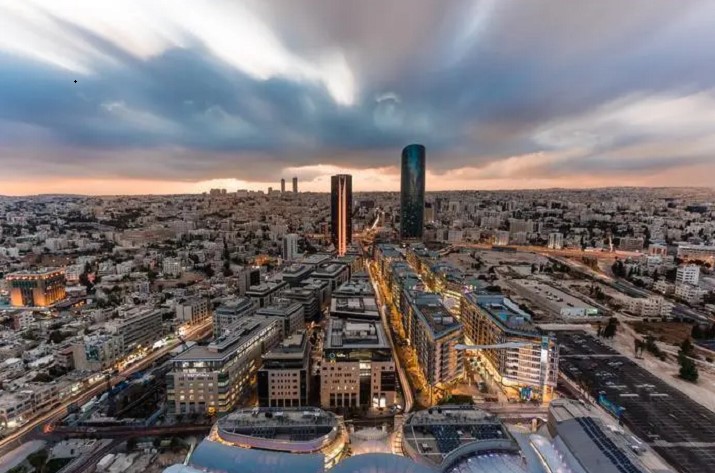
These impressive Smart City projects in the Middle East are not just urban spaces; they are living laboratories, where creativity, technology, and human ingenuity converge to create more efficient, sustainable, and inclusive communities. They offer practical smart cities solutions that can serve as inspiration.
Become a leader in the cities of the future with our Smart Cities Master
If you've found these smart city projects inspiring and are eager to contribute to the ever-evolving landscape of Smart City development, then consider our Smart Cities Master. Our programme is designed to equip you with the knowledge and skills needed to lead and shape these transformative urban projects.
The cities of tomorrow are being shaped today, and you have the opportunity to be part of this exciting journey!

